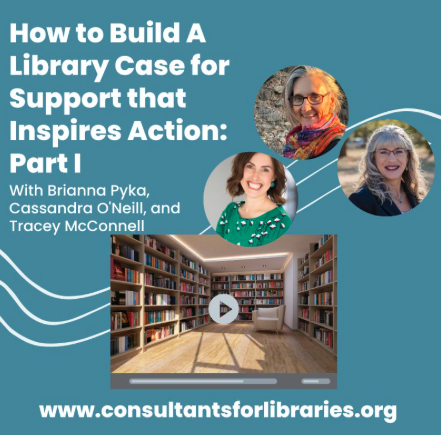Mastering the Art of Fundraising for Libraries: 10 Essential Tips for Success
- 7 mins
Does fundraising and specifically asking for money scare you? Don’t worry, you’re not alone. Fundraising doesn’t have to be overwhelming or scary. It’s incredibly important to master the art of soliciting funds effectively to support your library's growth and impact. At Fundraising for Libraries, we understand the vital role that libraries play in communities—they are hubs of knowledge, creativity, and connection. Our mission is to equip library directors with the skills and strategies they need to raise significant funds, expand programming, and enrich the experiences of their cardholders. For many Library Directors, understanding where to start is the most challenging. Here, we’ll explore ten tips to help you get started with solicitations specifically.
Know Your Project
Be sure you have a case statement or similar document that explains the basics of your project. If you don’t, this is an important first step.
In the world of fundraising for libraries, knowing your project inside and out is essential. It all starts with having a comprehensive case statement or a similar document that clearly outlines the basics of your project. This document serves as the foundation for your fundraising efforts, providing potential donors with a clear understanding of what you're trying to achieve, why it's important, and how their support can make a meaningful difference. Without this critical piece of information, your fundraising efforts may lack direction and fail to effectively communicate the value and impact of your project.
When you know your project well, you can confidently approach potential donors and articulate your vision with passion and clarity. You'll be able to answer questions, address concerns, and showcase the benefits of investing in your library's initiatives. Whether it's expanding programming, enhancing resources, or improving community outreach, a deep understanding of your project is the key to successful fundraising. So, before you embark on your fundraising journey, take the time to know your project inside and out—it's the first step towards unlocking the support your library needs to thrive.
Choose Known Donors to Call
Choose prospective donors to call upon whom you know. The goal is to avoid a cold call.
Choosing known donors to call is a strategic approach that can significantly enhance your success rate. Rather than making cold calls to unfamiliar individuals or organizations, targeting known donors allows you to leverage existing relationships and connections. These known donors may include previous supporters, community leaders, local businesses, or individuals with a demonstrated interest in library initiatives. By focusing your efforts on reaching out to these familiar faces, you're more likely to receive a warm reception and a willingness to engage in meaningful conversations about supporting your library.
The goal of choosing known donors to call is twofold: first, it increases the likelihood of a positive response, as donors are more inclined to contribute when approached by someone they know or trust. Second, it allows you to tailor your communication and messaging to better resonate with the interests and priorities of each donor. Whether it's highlighting past contributions, acknowledging shared values, or showcasing the specific impact of their support, personalized outreach to known donors can yield higher engagement and ultimately lead to greater fundraising success for your library initiatives.
Define Your Roles
Decide who asks and who outline the benefits of the project before the visit. Plan your in-person visit with a partner. Solicit in pairs!
Defining roles within your fundraising efforts is a crucial step towards maximizing your impact and success. By clearly delineating responsibilities, you can ensure that each team member plays to their strengths and contributes effectively to the fundraising process. When it comes to soliciting funds, it's important to decide who will take on the role of asking for donations and who will be responsible for outlining the benefits and impact of the project. This division of labor allows for a focused and coordinated approach during in-person visits with potential donors, ensuring that key messages are delivered with clarity and conviction.
Furthermore, planning your in-person visits with a partner can significantly enhance the effectiveness of your fundraising efforts. Soliciting in pairs not only provides mutual support and encouragement but also allows for a more dynamic and engaging interaction with donors. With two team members present, you can effectively address questions, handle objections, and build rapport more effectively. This collaborative approach not only strengthens your fundraising pitch but also demonstrates to donors that your library's initiatives are supported by a dedicated and cohesive team.
Make Your Own Commitment
If needed, you’ll be able to reference your own commitment to the project during your solicitation meeting.
Making your own commitment to the project is a powerful strategy. When you demonstrate personal dedication and investment in the project, it not only adds credibility to your pitch but also inspires confidence in potential donors. Your commitment serves as a testament to your belief in the project's value and potential impact, showcasing your passion and dedication. This personal connection can resonate strongly with donors, encouraging them to see the project as worthy of their support and investment.
Moreover, referencing your own commitment during solicitation meetings can be a persuasive tool. It allows you to speak from a place of authenticity and conviction, highlighting your personal stake in the success of the project. This can help build trust and rapport with donors, making them more receptive to your fundraising pitch. By demonstrating your own commitment, you not only lead by example but also create a compelling narrative that resonates with donors on an emotional level, ultimately increasing the likelihood of securing their support for your library's initiatives.
Emphasize Face-to-Face
Say something like, “I believe this project is important enough that we talk face-to-face.”
Emphasizing face-to-face interactions is a cornerstone of successful fundraising for libraries. While digital communication has its merits, nothing quite compares to the impact of a face-to-face meeting. When you express a willingness to engage in personal discussions with potential donors, it sends a powerful message of sincerity and commitment. Saying something like, "I believe this project is important enough that we talk face-to-face," conveys the significance and value you place on their potential contribution, making them feel valued and respected.
Face-to-face meetings also provide an opportunity to establish a deeper connection and foster trust between you and the donor. It allows for meaningful conversations where you can share your passion for the project, answer questions in real-time, and address any concerns directly. This personal touch can significantly enhance the donor's understanding of the project's impact and their role in supporting it. By emphasizing face-to-face interactions, you not only create a memorable experience but also lay the groundwork for long-lasting relationships built on trust, mutual understanding, and shared goals.
Highlight Your Passion
Invite the prospect to meet with you to learn more about your involvement, about the project and more about why the prospect should consider getting involved.
Highlighting your passion is a key element of successful fundraising for libraries. When you're genuinely passionate about a project or cause, it's contagious—it energizes and inspires others to get involved. When engaging with potential donors, take the opportunity to share your enthusiasm and personal connection to the project. Invite them to meet with you, not just to discuss fundraising logistics, but to delve into the deeper story behind your involvement and why the project holds such significance for you. This personal touch humanizes the fundraising process and helps donors connect on an emotional level, making them more likely to consider supporting your library's initiatives.
During these meetings, focus on conveying the impact and importance of the project, highlighting the benefits it will bring to the community and underscoring why their involvement is essential. Share success stories, testimonials, and concrete examples of how past contributions have made a difference. By painting a vivid picture of the project's potential and showcasing your passion, you can inspire prospective donors to see themselves as integral partners in bringing about positive change through their support.
Make it Personal
In all activities, ask yourself how you can make this experience more personal.
Making fundraising efforts personal is a powerful strategy that can significantly impact your success. In all your activities, whether it's crafting emails, making phone calls, or hosting events, ask yourself how you can make each interaction more personal and meaningful. Personalization shows donors that you value their individuality and are genuinely interested in forging a connection. This can be as simple as addressing them by name, referencing past interactions or contributions, and tailoring your messaging to align with their interests and priorities.
Furthermore, personalization goes beyond just communication—it extends to the overall donor experience. Consider how you can create personalized experiences during events or meetings, such as customized thank-you notes, exclusive updates on the project's progress, or opportunities for donors to engage directly with the library's initiatives. By making every touchpoint personal and relevant to the donor, you not only strengthen the relationship but also increase the likelihood of continued support and engagement. Ultimately, prioritizing personalization in fundraising efforts for libraries fosters stronger connections, inspires donor loyalty, and drives meaningful impact for the community.
Address Questions
Ask if the prospect had a chance to review the materials, i.e. your case statement. Are there any questions? Ask if you can clarify anything. Then, LISTEN.
Addressing questions effectively is a crucial aspect of successful fundraising for libraries. When meeting with potential donors, it's important to inquire if they've had the opportunity to review the materials, such as your case statement or project proposal. This not only shows respect for their time and preparation but also opens the door for them to ask any questions or seek clarifications. Encouraging questions demonstrates your transparency and willingness to provide information, which can instill confidence and trust in the donor's decision-making process.
After inviting questions, actively listen to the donor's inquiries and concerns without interrupting or assuming their perspective. Listening attentively allows you to understand their perspective, address any hesitations or uncertainties, and tailor your responses to alleviate their concerns effectively. Additionally, asking if you can clarify anything further shows your commitment to ensuring they have a thorough understanding of the project and its impact. By addressing questions thoughtfully and listening empathetically, you create a supportive and informative environment that fosters positive donor engagement and increases the likelihood of securing their support for your library's initiatives.
Listen to Reactions
Always listen for the prospect’s interests in relation to the project. Where are their HOT BUTTONS for the project/community?
Listening to reactions is a fundamental aspect of successful fundraising. When engaging with potential donors, it's essential to pay close attention to their reactions and responses to your project proposal or fundraising pitch. Listen not just to what they say, but also to their tone, body language, and overall demeanor. This can provide valuable insights into their level of interest, enthusiasm, and potential areas of alignment with the project's goals and values. By actively listening to reactions, you can identify their "hot buttons" or areas of particular interest related to the project or the community it serves.
Understanding the prospect's hot buttons allows you to tailor your communication and messaging to resonate more effectively with their interests and priorities. Whether it's highlighting specific aspects of the project that align with their passions, addressing concerns that are important to them, or showcasing the direct impact their support can have on the community, leveraging their hot buttons can significantly enhance your fundraising efforts. By acknowledging and responding to their reactions in a thoughtful and targeted manner, you can strengthen the connection with potential donors and increase the likelihood of securing their support for your library's initiatives.
Remember that effective fundraising for libraries is about more than just asking for money—it's about building relationships, sharing your passion, and demonstrating the tangible impact of your projects on the community. By following the ten tips we covered, you'll be well-equipped to engage with donors, address their questions and concerns, and ultimately secure the support needed to take your library to new heights. Thank you for your dedication to advancing libraries and ensuring they remain vibrant centers of learning and opportunity for all.
We are so thankful for your commitment!




